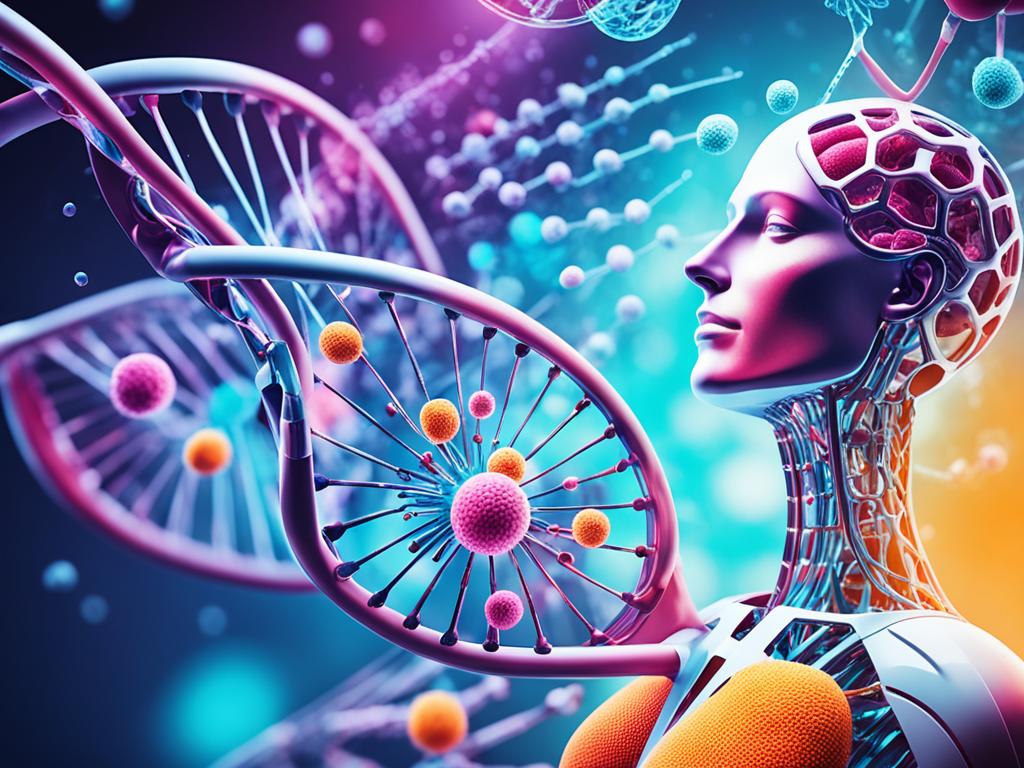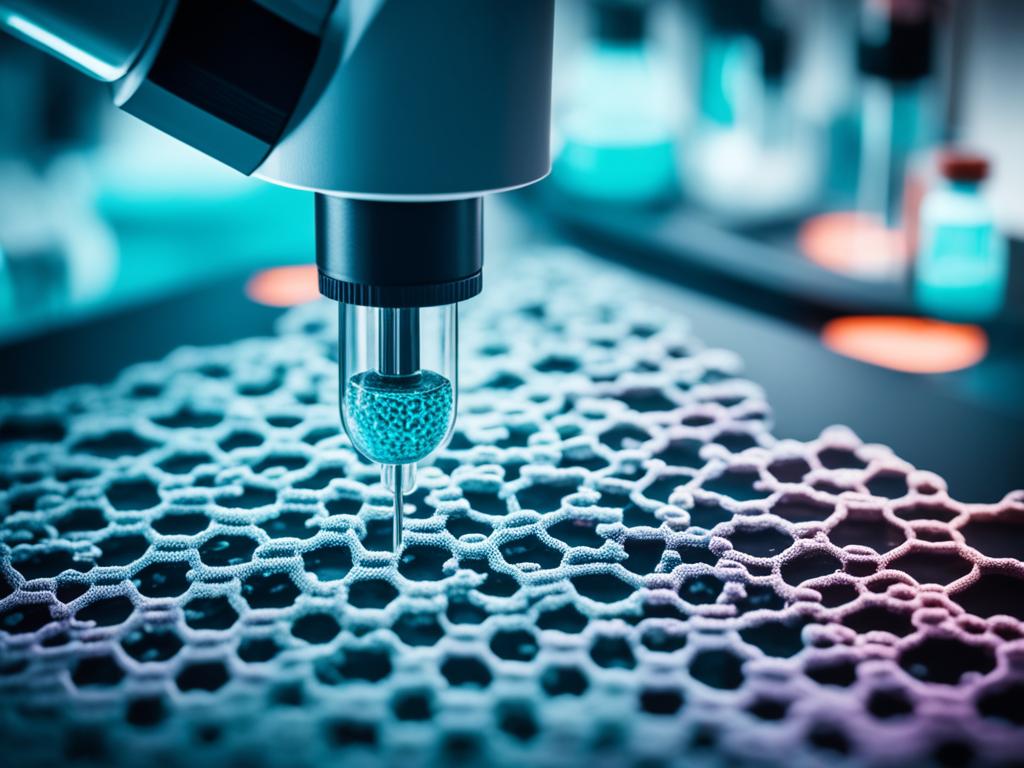Biotechnology has changed the world of medicine and healthcare. It has brought incredible advancements that make patient care better. These changes include precision medicine and regenerative therapies. They are making modern medicine look very different. Have you wondered how biotechnology has changed healthcare? We will dive into how this field is making patient care better and changing the future of healthcare.
Key Takeaways:
- Biotechnology has revolutionized healthcare, leading to groundbreaking advances in medicine.
- Precision medicine allows for tailored treatment plans based on individual patients’ genetic profiles.
- Biotechnology has revolutionized the drug development process, resulting in more effective and targeted therapies.
- Gene editing and gene therapy hold immense potential for treating genetic disorders.
- Regenerative medicine harnesses biotech innovations to restore or replace damaged tissues and organs.
The Impact of Biotechnology in Medicine

Biotechnology changes have deeply shaped medicine, making treatments and care better. Thanks to these discoveries, doctors have new tools and ideas. This has made big changes in how we fight illnesses and keep people well.
Biotech is especially great at coming up with new therapies and drugs. It focuses on specific illnesses, making treatments more personal and effective. This kind of care is helping patients live better lives.
Biotechnology has improved how we spot and understand diseases. Using tests that look at genes and molecules can catch illnesses early. This means doctors can start treatments sooner and help patients more. It’s good for people and saves money on healthcare.
Then, there’s regenerative medicine. This uses stem cells and engineering to fix tissues. So if someone is hurt or has a disease, there’s new hope. This work could change how we do organ transplants and the future of caring for patients.
Biotech discoveries have unlocked new possibilities and transformed the landscape of medicine, offering innovative solutions to previously untreatable conditions.
Last but not least, biotech helps get vital drugs to people quickly. It speeds up how we find and make new meds. Now, patients can use new treatments sooner than ever.
Biotech Innovations in Medicine: A Comparative Analysis
| Biotechnology Breakthroughs | Impact |
|---|---|
| Gene Editing | Provides a targeted approach for modifying disease-causing genes and reducing the progression of genetic disorders |
| Immunotherapy | Utilizes the body’s immune system to target cancer cells, resulting in improved treatment outcomes and reduced side effects |
| Bioinformatics | Enables the analysis of large-scale biological data, facilitating personalized medicine and drug discovery |
| Biosensors | Offers real-time monitoring of biomarkers, allowing for early detection of diseases and optimization of treatment plans |
Biotechnology has made a huge difference in medicine. It keeps getting better and we look forward to more life-changing discoveries. These advancements bring hope and better health to people everywhere.
Improving Diagnostics and Disease Prevention
Biotechnology breakthroughs are changing healthcare for the better. They’re making diagnostics and disease prevention much more effective. This is a big deal because it changes how we understand and fight diseases.
Now, doctors can use advanced tools and tests. These tests can find illnesses much earlier and with more accuracy. This means better care and outcomes for patients.
“The use of biotechnology in testing has changed everything,” says Dr. Emily Williams. She’s a leader in using genes to fight disease. “We can find unique signs in a person’s genes. This tells us a lot about their disease risks.”
Biotechnology is also making medicine more personal. Doctors can now pick treatments that fit a patient’s genes. This is called precision medicine and it’s very exciting. It’s making treatments better and safer for everyone.
New tech and biotech are making disease prevention much stronger too. Vaccines are getting better. They use new methods to protect us from diseases more effectively.
On top of that, genetic tests are a big game-changer. They can show us which diseases we might get. With this knowledge, we can act early to stay healthy.
Advancements in Diagnostics and Disease Prevention:
- Highly accurate diagnostic tests that detect diseases at earlier stages.
- Identification of genetic markers and biomarkers for disease risk assessment.
- Personalized medicine, tailoring treatments to an individual’s genetic profile.
- Enhanced disease prevention through advanced vaccine development.
- Genetic screening for proactive healthcare management.
Biotechnology and medical tech keep getting better. They let us target health problems more precisely. Every new discovery helps us find diseases earlier, treat people more personally, and prevent illnesses effectively. This is making the world healthier.
Precision Medicine: Tailoring Treatments to Individuals
Precision medicine is changing how we see healthcare. Thanks to biotechnology, we can now change treatments to fit each person perfectly. This means using the latest in medicine and science to base treatments on a person’s specific genes and biology. The goal is to make treatments work better for everyone, changing how we think of health care.
At the heart of precision medicine are new ways to spot health issues early. These methods let doctors check a person’s genes to find out if they might get sick. By looking at what causes illnesses, doctors can then create treatments that stop the problem at its source. This personal touch can mean that treatments work better and people get healthier in the long run.
So, how do we get here? Well, it’s thanks to tools like genomic sequencing and smart computer programs. These tools crunch a lot of data, looking for clues in our genes. This helps doctors pick treatments that are most likely to work. These high-tech methods make medicine better and can even suggest new paths for research.
“Precision medicine holds immense promise for patients by providing tailored treatment approaches that consider their unique genetic characteristics. This breakthrough in medicine will undoubtedly lead to more effective treatments and improved patient outcomes.”
Precision medicine also helps with tough issues like cancer. By digging deep into the genes of tumors, we can find the best ways to fight them. This means making treatments that go straight to the heart of the problem. Tumors, for example, can be treated more effectively by knowing their genetic secrets.
Work in precision medicine isn’t stopping. Scientists keep looking for new answers and better ways to treat diseases. They want to understand more about how our genes affect our health. This work is key to unleashing the full power of precision medicine in many areas of healthcare.
Thanks to precision medicine, treatments can be made just for you. Your own genetic makeup is used to create a special treatment plan. This not only makes treatments better but also safer. It could mean a big change in how we care for our health, focusing on you as an individual.
Revolutionizing Drug Development and Therapeutics
Biotechnology is changing how we make medicines. It leads to new treatments and better ways to help patients. These changes are part of a bigger move in modern medicine that focuses on the individual.
One key area where biotech shines is in making new drugs. With state-of-the-art tools, researchers find drugs that work better, faster. This helps us make medicines that meet health needs we couldn’t before.
Biotechnology also helps make treatments that fit a person’s genes, called precision medicine. We use what we know about a patient’s genes to plan treatments just for them. This cuts down on bad side effects and boosts how well the treatment works. We can now find out who will benefit most from a certain treatment.
It doesn’t stop there. Biotech improves how we give out medicines and how they work in the body. Nanotechnology, for example, lets us send medicine straight to where it’s needed. This makes the medicine better at its job with fewer side effects. And regenerative medicine is an exciting part of biotech. It hints at fixing damaged tissue and growing new organs, something we could only dream of before.
To wrap it up, biotechnology is a game-changer in medicine. It speeds up finding new medicines, makes treatments personal, and changes how we think about healing. Biotech is at the front of the line, leading us to better patient care through amazing scientific discoveries.
Advancements in Gene Editing and Gene Therapy
The world of biotechnology is seeing big steps forward in gene editing and therapy. These advances are changing how we fight illnesses. They help treat genetic problems and make patient outcomes better.
CRISPR-Cas9, a gene editing tool, is changing the game by letting scientists edit genes with great accuracy. This technology can fix DNA in living things. It’s a hope for many with genetic diseases.
Gene therapy is also making a big difference by treating the root cause of inherited illnesses. It puts working genes into the patient’s cells. This method might help cure diseases we once thought were impossible to treat.
One key use of gene editing is in treating inherited eye diseases. These can lead to vision loss and blindness. By fixing the genes at fault, there’s hope to give sight back to some.
Unlocking Potential for Rare Diseases
For people with rare diseases, gene editing and therapy can bring new hope. When traditional treatments don’t work, these methods could help. Scientists are working on tailor-made cures based on each person’s unique genes.
New gene discoveries could impact many areas, from genetic issues to cancer and infectious diseases. The field is bursting with excitement over the possibilities these advancements offer.
“Gene editing and therapy have the potential to revolutionize the treatment and management of genetic diseases, offering new hope to patients around the world.” – Dr. Emily Chen, Geneticist
Ethical Considerations and Future Prospects
But, with these big steps come questions on ethics. The power to change genes might be misused. We need to be careful how we use these technologies.
The future of gene editing and therapy is full of possibilities. By exploring new treatments and improving current methods, we’re moving towards a time when many diseases could be curable.
Harnessing Biotechnology for Regenerative Medicine
Regenerative medicine offers a new way to look at healthcare. It uses biotechnology to heal the body. This technology helps the body fix and rebuild damaged parts, giving new hope to those in need.
Thanks to ongoing research, we’ve made big steps in regenerative medicine. Biotechnology tools have been key to these progressions. They help us in creating new tissues and organs or repairing existing ones.
Stem cell therapy is a big deal in regenerative medicine. This method uses cells that can become different types of cells. They help in fixing and replacing tissues. For example, they’ve shown hope in heart disease, Alzheimer’s, and spinal cord injury treatments.
Biotechnology is also looking into making organs and tissues in the lab. Scientists are trying to build organs that match a person’s needs. This might help solve the problem of not having enough organs for transplant.
Another area where biotechnology shines is in gene editing with CRISPR-Cas9. This tech lets us change specific genes. It shows promise for treating genetic diseases by fixing the error in the genes.
Not to forget about 3D printing. With the help of biotechnology, we can make detailed tissues. This is exciting because it could lead to making implants and tissues that match the patient perfectly.
The mix of biotechnology and regenerative medicine is really pushing healthcare forward. With all these efforts, we might soon be able to repair damaged organs. This could greatly raise the quality of life for many people.
Key Advances in Harnessing Biotechnology for Regenerative Medicine
- Stem cell therapy: Utilizing the regenerative potential of stem cells for tissue repair and regeneration.
- Bioengineered organs and tissues: Developing customized organs and tissues using biotechnology.
- Gene editing: Precisely modifying genes to correct genetic mutations and treat genetic disorders.
- Advanced biomaterials and 3D printing: Creating functional tissues and patient-specific implants.
Case Study: Biotech Solutions for Heart Disease
“Research into regenerative medicine has provided a glimmer of hope for patients with heart disease. Biotechnological advancements have paved the way for stem cell therapies and tissue engineering approaches that hold immense potential in repairing damaged heart tissues and restoring cardiac function.”
– Dr. Sarah Rodriguez, Cardiologist
| Advancements in Harnessing Biotechnology for Regenerative Medicine | Implications |
|---|---|
| Stem Cell Therapy | Potential treatment for heart disease, neurological disorders, and spinal cord injuries. |
| Bioengineered Organs and Tissues | Address the organ shortage crisis and provide patient-specific solutions for transplantation. |
| Gene Editing | Target and correct genetic mutations, offering new hope for patients with genetic disorders. |
| Advanced Biomaterials and 3D Printing | Enable the creation of functional tissues and patient-specific implants for enhanced healing and integration. |
Conclusion
Biotechnology has changed modern medicine greatly. It has brought new treatments and ways to care for patients. This article has shown the big impact of biotechnology on medicine.
It has helped us diagnose and prevent diseases better. With it, we can make medicines that work for just one person. This is called precision medicine. It makes treatments more personal and effective.
There are also big steps in fixing genes and using gene therapy. This can help a lot with genetic diseases. It opens doors for better health care in the future. Biotechnology is also helping with growing new tissue and transplanting organs. This gives hope to many sick people.
Looking ahead, there’s still a lot to explore in biotechnology. New findings promise to change how we care for patients. They offer new hope and ways to make people’s lives better.




